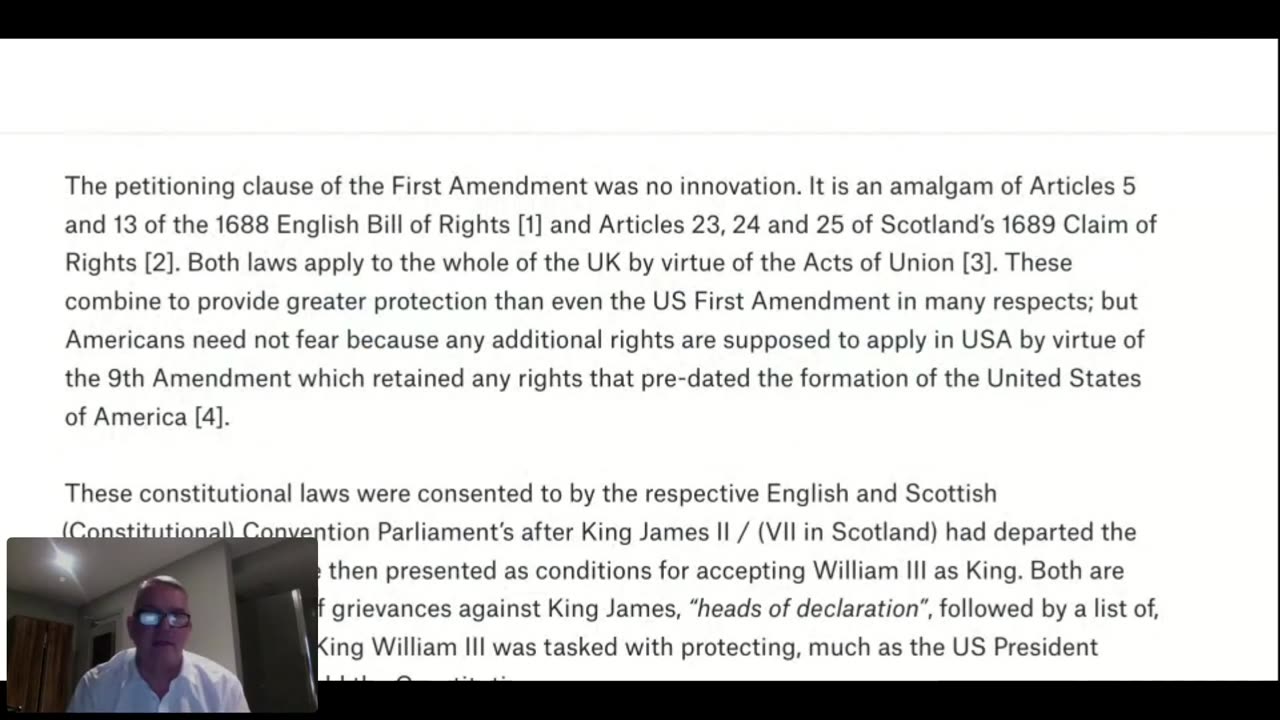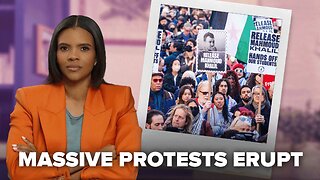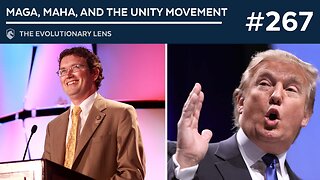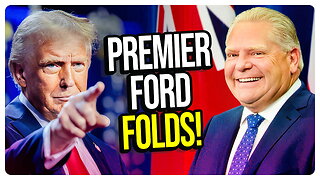Premium Only Content

England had the First Amendment first.
Full Article Now Published Here - https://www.ukcolumn.org/article/britain-had-the-first-amendment-first
Original Video - https://rumble.com/v5cvnff-grahamhmoore-on-twitter-x-has-been-suspended.-why-the-truth-and-real-law-ma.html
Or Here - https://rumble.com/v5d15s5-we-the-english-have-second-amendment-rights.html
Clip From (The Full English Show, On Rumble)
Graham Moore Aka Daddy Dragon.
Limiting our Right to free speech is off bounds when talking about government policies because all legislation requires the 'common consent' of the people. How could we possibly consent if we cannot deliberate between ourselves on the merits of policy?
To enact legislation which interferes with the fixed constituted processes required for good governance, is a subversion of what is constituted.
To freely deliberate issues that affect us is paramount, owing to the fact that our thinking and decisions affect the way that we as individuals vote at elections.
To restrict such speech is damaging to the legislative process, to which all legislation must have the 'common consent of the Kingdom' in Parliament. This is an ancient constitutional principle and it is the common law Right of the individual to take part in that process, entrusting his consent to his elected representative to sit and vote on his behalf in Parliament.
Again, this Right is a Common Law Right and our Constitutional Law declares and confirms that the Laws of England are our Birthright and that we are to be governed accordingly.
Act of Settlement (1700)
Section IV: The Laws and Statutes of the Realm confirmed.
And whereas the laws of England are the birth-right of the people thereof, and all the Kings and Queens, who shall ascend the throne of this Realm, ought to administer the government of the same according to the said laws, and all their officers and ministers ought to serve them respectively according to the same: the said Lords Spiritual and Temporal, and Commons, do therefore further humbly pray, That all the laws and statutes of this Realm for securing the established religion, and the rights and liberties of the people thereof, and all other laws and statutes of the same now in force, may be ratified and confirmed, and the same are by His Majesty, by and with the advice of the said Lords Spiritual and Temporal, and Commons, and by authority of the same, ratified and confirmed accordingly.' - An Act for the further Limitation of the Crown and better securing the Rights and Liberties of the Subject [Act of Settlement (1700)]
And to that end, the Monarch swears a solemn oath to govern by our Law, and gives royal assent converting a Bill into an lawfully enforceable Act of Parliament.
Coronation Oath Act (1688)
'Will You solemnely Promise and Sweare to Governe the People of this Kingdome of England and the Dominions thereto belonging according to the Statutes in Parlyament Agreed on and the Laws and Customs of the same?
The King and Queene shall say,
I solemnly Promise soe to doe.
As such, any anti free speech (or other repugnant and unconstitutional) legislation passed, is passed solely by the say so (the assent) of the Monarch.
And there is lawful remedy for Kings who would subvert our Constitution and Law, and attempt to destroy our People. A Monarch that subverts our Law and Constitution, by performance renounces his Right to govern, which as the High Court of the 1689 Convention Parliament established, is an abdication.
Any Crown servants who act against what was constituted by the court of the Convention Parliament and enshrined (for ever) in our Law, is a subverter of our Constitution, ... and we all know (or SHOULD know) what happened to those found guilty of 'conspiring' to subvert our Constitution in the Cato Street Conspiracy,
The case of R v Thistlewood (1820) established that
'to destroy the Constitution of the country is an act of treason.'
Britain had the First Amendment first. by Philip Ridley, UK Column. The Petitioning Clause of the US First Amendment was no innovation in 1789. It is an amalgam of Articles 5 and 13 of the 1688 English Bill of Rights and Articles 23, 24 and 25 of Scotland’s 1689 Claim of Right. The subjects' immunities of both the English Bill and the Scottish Claim of Right apply to the whole of the UK by virtue of the Acts of Union, Art. 4
The Petitioning Clause is of the greatest importance because the majority, if not all, of speech under threat is speech that is critical of government or speech that the Government frowns upon. Other free speech is rarely, if ever, at any threat from Congress or Parliament.
English Bill of Rights [1688]
Art. 5: That it is the Right of the Subjects to petition the King, and all Commitments [to jail] and Prosecutions for such Petitioning are Illegall.
Art. 13: And that for Redresse of all Grievances and for the amending strengthening and preserveing of the Lawes, Parlyaments ought to be held frequently.
“The Right of the Subjects to petition the King” means the same thing as the US Bill of Rights’ phrase “the right of the people to petition the Government”, because the British Government is the King’s government, known formally as His Majesty’s or HM Government.
This subject's right should be considered to extend to all branches of government, including legislatures both national and local, courts, juries and executive officials and agencies. This includes public employers, public university systems, and state school systems; and could be considered to extend to private organisations and individuals benefiting from public money.
The English Bill of Rights [1688]
Art. 9: That the Freedome of Speech and Debates or Proceedings in Parlyament ought not to be impeached or questioned in any Court or Place out of Parlyament.
Article 9 of the SUBJECT'S rights, in an Act declaring the Rights and Liberties of the SUBJECT, which states:
The said Rights claimed.
And they doe Claime Demand and Insist upon all and singular the Premises as THEIR undoubted Rights and Liberties and that noe Declarations Judgements Doeings or Proceedings to the Prejudice of the PEOPLE in any of the said Premisses ought in any wise to be drawne hereafter into Consequence or Example. To which Demand of THEIR Rights they are particularly encouraged by the Declaration of this Highnesse the Prince of Orange as being the onely meanes for obtaining a full Redresse and Remedy therein. Haveing therefore an intire Confidence That his said Highnesse the Prince of Orange will perfect the Deliverance soe farr advanced by him and will still preserve THEM from the Violation of THEIR Rights which THEY have here asserted and from all other Attempts upon THEIR Religion Rights and Liberties.
'Subjects’ Liberties to be allowed, and Ministers hereafter to serve according to the same.
VI. Now in pursuance of the premisses, the said lords spiritual and temporal, and commons, in parliament assembled, for the ratifying, confirming and establishing the said declaration, and the articles, clauses, matters, and things therein contained, by the force of a law made in due form by authority of parliament, do pray that it may be declared and enacted, That all and singular the rights and liberties asserted and claimed in the said declaration, are the true, ancient, and indubitable rights and liberties of the PEOPLE of this kingdom, and so shall be esteemed, allowed, adjudged, deemed, and taken to be, and that all and every the particulars aforesaid shall be firmly and strictly holden and observed, as they are expressed in the said declaration; and all officers and ministers whatsoever shall serve their Majesties and their successors according to the same in all times to come.'
That all and singular rights and liberties asserted and claimed in the said declaration, are the true, ancient, and indubitable rights and liberties of the PEOPLE, and all and singular Premises are THEIR undoubted Rights and Liberties. That would include Article 9: Freedom of Speech.
Historical context: The rights of the people were intertwined with Parliament. Thus, the Bill of Rights made it clear that the monarch could not infringe upon the people's representatives either, the rights of the people were connected to the rights of their representatives in Parliament. Protecting MPs’ speech was a way to protect the people’s rights. Protecting MPs’ speech was a way to ensure that the people’s right to freedom of speech was upheld, allowing their voices to be heard through their elected representatives without fear of oppression or retribution.
Speaking between ourselves about government policy and legislation cannot be restricted in any way because by our constitution and common law, all legislation requires the CONSENT of the People. If you're restricted in any way from discussing it, how would you know all of the arguments to make the decision to consent or not, and how would you then choose the correct representative to vote to your Will?
Sources: The Secret People - @SecretPeopleTSP (Twitter)
https://x.com/SecretPeopleTSP/status/1830050452387267044
https://x.com/SecretPeopleTSP/status/1845456267344498981
https://x.com/SecretPeopleTSP/status/1832009212924203030
https://x.com/SecretPeopleTSP/status/1840695214144385216
-
 51:59
51:59
Candace Show Podcast
3 hours agoMahmoud Khalil’s Detainment: Fighting Terrorism Or Speech? | Candace Ep 158
55.5K217 -
 LIVE
LIVE
Dr Disrespect
7 hours ago🔴LIVE - DR DISRESPECT - PUBG - PRO TACTICALLY WINNING
2,320 watching -
 1:02:40
1:02:40
In The Litter Box w/ Jewels & Catturd
23 hours agoUSAID to Staff: Shred and Burn | In the Litter Box w/ Jewels & Catturd – Ep. 760 – 3/12/2025
53.8K25 -
 2:21:38
2:21:38
Darkhorse Podcast
6 hours agoMAGA, MAHA, and the Unity Movement: The 267th Evolutionary Lens with Bret Weinstein and Heather Heying
57.8K28 -
 1:58:45
1:58:45
The Quartering
7 hours agoCorrupt Democrats Caught SHREDDING Evidence, Assassination Plot On Alex Jones, Tariff Fallout & More
126K43 -
 1:27:14
1:27:14
The Officer Tatum
6 hours agoLIVE: Trump and Elon BREAK INTERNET With BRAND NEW TESLA | Officer Tatum Show EP 78
61K45 -
 2:10:41
2:10:41
Adam Carolla
1 day agoCatalytic Converter Theft Turns Deadly + UPDATE! Rebuilding Malibu | Adam’s Wild Malibu Trip
39.7K16 -
 47:43
47:43
Russell Brand
8 hours agoWho’s Controlling the Narrative? Iran, Epstein, and the Fight Over Women’s Sports – SF552
175K101 -
 1:54:25
1:54:25
vivafrei
9 hours agoCanadian Premiers BUCKLE! "Gender" Wars in Congress! Madness in Seattle AND MORE! Viva Frei Live
97.3K125 -
 1:58:28
1:58:28
The Charlie Kirk Show
7 hours agoWhy The Left Hates Musk + Punishing Campus Antisemitism | Terrell | 3.12.25
121K25